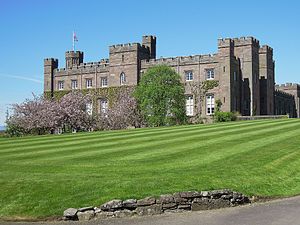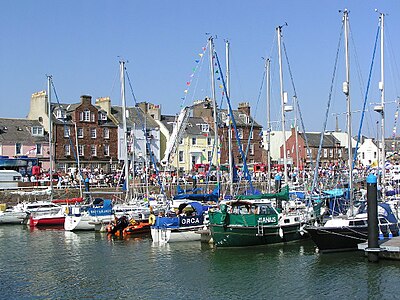Portal:Scotland
| Main Page | Selected articles 1 | Selected articles 2 | Selected biographies | Selected quotes | Selected pictures | Featured Content | Categories & Topics |
Introduction
 |

|
|

| ||
Scotland (Scots: Scotland; Scottish Gaelic: Alba) is a country that is part of the United Kingdom. It contains nearly one-third of the United Kingdom's land area, consisting of the northern part of the island of Great Britain and more than 790 adjacent islands, principally in the archipelagos of the Hebrides and the Northern Isles. To the south-east, Scotland has its only land border, which is 96 miles (154 km) long and shared with England; the country is surrounded by the Atlantic Ocean to the north and west, the North Sea to the north-east and east, and the Irish Sea to the south. The population in 2022 was 5,439,842 and accounts for 8% of the population of the UK. Edinburgh is the capital and Glasgow is the largest of the cities of Scotland.
The Kingdom of Scotland emerged as an independent sovereign state in the 9th century. In 1603, James VI inherited the Kingdom of England and the Kingdom of Ireland, forming a personal union of the three kingdoms. On 1 May 1707 Scotland and England combined to create the new Kingdom of Great Britain, with the Parliament of Scotland subsumed into the Parliament of Great Britain. In 1999 a Scottish Parliament was re-established, and has devolved authority over many areas of domestic policy. The country has a distinct legal system, educational system, and religious history from the rest of the UK, which have all contributed to the continuation of Scottish culture and national identity. Scottish English and Scots are the most widely spoken languages in the country, existing on a dialect continuum with each other. Scottish Gaelic speakers can be found all over Scotland, however the language is largely spoken natively by communities within the Hebrides. The number of Gaelic speakers numbers less than 2% of the total population, though state-sponsored revitalisation attempts have led to a growing community of second language speakers.
The mainland of Scotland is broadly divided into three regions: the Highlands, a mountainous region in the north and north-west; the Lowlands, a flatter plain across the centre of the country; and the Southern Uplands, a hilly region along the southern border. The Highlands are the most mountainous region of the British Isles and contain its highest peak, Ben Nevis, at 4,413 feet (1,345 m). The region also contains many lakes, called lochs; the term is also applied to the many saltwater inlets along the country's deeply indented western coastline. The geography of the many islands is varied. Some, such as Mull and Skye, are noted for their mountainous terrain, while the likes of Tiree and Coll are much flatter. (Full article...)
Selected article

Scone Palace /ˈskuːn/ is a Category A-listed historic house near the village of Scone and the city of Perth, Scotland. Ancestral seat of Earls of Mansfield, built in red sandstone with a castellated roof, it is an example of the Gothic Revival style in Scotland.
Scone was originally the site of an early Christian church, and later an Augustinian priory. Scone Abbey was severely damaged in 1559 during the Scottish Reformation after a mob whipped up by the famous reformer, John Knox, came to Scone from Dundee. Having survived the Reformation, the Abbey in 1600 became a secular Lordship (and home) within the parish of Scone, Scotland. The Palace has thus been home to the Earls of Mansfield for over 400 years. During the early 19th century the Palace was enlarged by the architect William Atkinson. In 1802, David William Murray, 3rd Earl of Mansfield, commissioned Atkinson to extend the Palace, recasting the late 16th-century Palace of Scone. The 3rd Earl tasked Atkinson with updating the old Palace whilst maintaining characteristics of the medieval Gothic abbey buildings it was built upon, with the majority of work finished by 1807. (Full article...) Read more ...
Selected quotes
" ... God gave us our memories so that we might have roses in December ... "
" ... A man, as a general rule, owes very little to what he is born with – a man is what he makes of himself ... "
In the news

- 7 May 2024 – Premiership of John Swinney
- The Scottish Parliament votes to elect John Swinney as First Minister of Scotland with 64 votes in favour and seven abstentions from the Scottish Greens. (BBC News)
- 6 May 2024 – 2024 Scottish National Party leadership election
- John Swinney is elected leader of the Scottish National Party following the resignation of First Minister Humza Yousaf. (The Guardian)
- 4 May 2024 – International reactions to the Israel–Hamas war
- Palestinian doctor and rector at the University of Glasgow Ghassan Abu-Sittah is denied entry into France after landing at Charles de Gaulle airport on his way to speak at the French Senate. Last month, he was denied entry into Germany. (Al Jazeera)
- 1 May 2024 – 2024 Scottish government crisis
- The Scottish National Party administration survives the vote of no confidence earlier this week, prompting the party to seek a replacement for outgoing First Minister Humza Yousaf. (Al Jazeera)
- 29 April 2024 – 2024 Scottish government crisis
- Ahead of a planned vote of no confidence, Scottish First Minister Humza Yousaf announces that he will resign from office. (CNBC) (The New York Times)
- 25 April 2024 – 2024 Scottish government crisis
- Premiership of Humza Yousaf
Selected biography

John Muir (/mjʊər/ MURE; April 21, 1838 – December 24, 1914), also known as "John of the Mountains" and "Father of the National Parks", was a Scottish-born American naturalist, author, environmental philosopher, botanist, zoologist, glaciologist, and early advocate for the preservation of wilderness in the United States.
His books, letters and essays describing his adventures in nature, especially in the Sierra Nevada, have been read by millions. His activism helped to preserve the Yosemite Valley and Sequoia National Park, and his example has served as an inspiration for the preservation of many other wilderness areas. The Sierra Club, which he co-founded, is a prominent American conservation organization. In his later life, Muir devoted most of his time to his wife and the preservation of the Western forests. As part of the campaign to make Yosemite a national park, Muir published two landmark articles on wilderness preservation in The Century Magazine, "The Treasures of the Yosemite" and "Features of the Proposed Yosemite National Park"; this helped support the push for US Congress to pass a bill in 1890 establishing Yosemite National Park. The spiritual quality and enthusiasm toward nature expressed in his writings has inspired readers, including presidents and congressmen, to take action to help preserve large nature areas.
John Muir has been considered "an inspiration to both Scots and Americans". Muir's biographer, Steven J. Holmes, believes that Muir has become "one of the patron saints of twentieth-century American environmental activity", both political and recreational. As a result, his writings are commonly discussed in books and journals, and he has often been quoted by nature photographers such as Ansel Adams. "Muir has profoundly shaped the very categories through which Americans understand and envision their relationships with the natural world", writes Holmes.
Selected picture
Arbroath or Aberbrothock (Scottish Gaelic: Obair Bhrothaig) is a former royal burgh on the North Sea coast, around 16 miles (25.7 km) ENE of Dundee and 45 miles (72.4 km) SSW of Aberdeen. It is the largest town in the council area of Angus. and has a population of 22,785.
Photo credit: Karen Vernon
Did You Know...

- ... that the Springburn Winter Gardens, the largest single-span glasshouse in Scotland, has been derelict since 1983?
- ... that prior to winning their first of nine consecutive titles in the 1965–66 season, Celtic had not been champions of the Scottish Football League for 12 years?
- ... that in 1999 two necklaces were repatriated to the Cook Islands National Museum from a museum in Angus, Scotland?
- ... that Scottish novelist Isla Dewar said "if ... a thing is not worth doing then it's worth doing fabulously, amazingly, with grace, style and panache"?
- ... that Crawfurd v The Royal Bank (1749) established in Scots law that a bona fide recipient of stolen banknotes cannot be forced to return them to their original owner?
- ... that General George Monck accepted that 500 Scots, including women and children, were killed when his army stormed Dundee in 1651?
- ... that John Neilson, a Scottish immigrant to Lower Canada, became a major publisher and bookseller, and was reportedly "the largest consumer of paper" in the country?
- ... that The Love Songs of W.E.B. Du Bois, a new novel by Honorée Fanonne Jeffers, mixes narrative with "love songs" that illuminate the lives of the protagonist's African, Creek, and Scottish ancestors?
Get involved
For editor resources and to collaborate with other editors on improving Wikipedia's Scotland-related articles, see WikiProject Scotland.
To get involved in helping to improve Wikipedia's Scotland related content, please consider doing some of the following tasks or joining one or more of the associated Wikiprojects:
- Visit the Scottish Wikipedians' notice board and help to write new Scotland-related articles, and expand and improve existing ones.
- Visit Wikipedia:WikiProject Scotland/Assessment, and help out by assessing unrated Scottish articles.
- Add the Project Banner to Scottish articles around Wikipedia.
- Participate in WikiProject Scotland's Peer Review, including responding to PR requests and nominating Scottish articles.
- Help nominate and select new content for the Scotland portal.
Do you have a question about The Scotland Portal that you can't find the answer to?
Post a question on the Talk Page or consider asking it at the Wikipedia reference desk.
Related portals
Other language versions
Associated Wikimedia
The following Wikimedia Foundation sister projects provide more on this subject:
-
Commons
Free media repository -
Wikibooks
Free textbooks and manuals -
Wikidata
Free knowledge base -
Wikinews
Free-content news -
Wikiquote
Collection of quotations -
Wikisource
Free-content library -
Wikispecies
Directory of species -
Wikiversity
Free learning tools -
Wikivoyage
Free travel guide -
Wiktionary
Dictionary and thesaurus







































